- Home
- Eoin Colfer
The Time Paradox Page 6
The Time Paradox Read online
Page 6
Angeline was horrified. “You sound just like . . .”
“Father? Good. Someone has to be rational.”
Artemis’s face was stern, but inside he quailed. How could he speak to his mother like this, when she was literally driven demented by grief?
Why have I not fallen to pieces? he wondered, and the answer came to him quickly. I am a Fowl, and Fowls have always triumphed in the face of adversity.
“But fifty thousand, Mother? For a lemur?”
“They may find a female,” argued Angeline. “Then we will have saved a species.”
There is no point in arguing, thought Artemis. Logic cannot prevail here.
“And where is lucky silky now?” he asked innocently, smiling as a ten-year-old should when discussing a small furry animal.
“He is safe in Rathdown Park. Living like a king. Tomorrow he is being flown to a special artificial habitat in Florida.”
Artemis nodded. Rathdown Park was a privately funded nature reserve in Wicklow, specially constructed to protect endangered species. It had tighter security than the average Swiss bank.
“That’s wonderful. Perhaps I will visit the fifty-thousand-euro monkey.”
“Now, now, Artemis,” his mother chided. “Silky is a lemur; they predate monkeys, as you well know.”
I know but do not care! Artemis wanted to scream. Father is missing, and you have spent the expedition money on a lemur!
But he held his tongue. Mother was delicate at the moment, and he did not want to contribute to her instability.
“Rathdown doesn’t usually accept visitors,” continued Angeline. “But I am sure if I made a call they would make an exception for you; after all, the Fowls did pay for the primate village.”
Artemis appeared delighted. “Thank you, Mother. That would be a real treat for me, and Butler too. You know how he likes small furry creatures. I would love to see the species we have saved.”
Angeline smiled with a degree of madness that scared her son terribly.
“Well done, Artemis. This is one in the eye for the big-business men. Mother and son, united we shall save the world. I shall tease your father terribly when he gets home.”
Artemis backed slowly toward the door, his heart in his shoes.
“Yes, Mother. United we shall save the world.”
Once the door had closed behind him, Artemis stepped briskly downstairs, fingers conducting imaginary music as he plotted. He detoured to his bedroom and quickly dressed for a trip, then continued to the kitchen, where he found Butler slicing vegetables with a Japanese kodachi short sword. He was now chef and gardener as well as protector.
The huge bodyguard was making quick work of a cucumber.
“A summer salad,” he explained. “Just greens, hardboiled egg, and some chicken. I thought crème brûlée for dessert. It will give me a chance to try out my flamethrower.” He glanced across at Artemis and was surprised to see him dressed in one of his two suits, the dark blue one he had worn recently to the opera in Covent Garden. Artemis had always been a neat dresser, but a suit and tie were unusual even for him.
“Are we going somewhere formal, Artemis?”
“Nowhere formal,” said Artemis, with a coldness in his tone that the bodyguard had not heard before but would come to know well. “Just business. I am in charge of the family affairs now, and so I should dress accordingly.”
“Ah . . . I detect a distinct echo of your father.” Butler wiped the sword carefully, then pulled off his apron. “We have some typical Fowl family business to conduct, do we?”
“Yes,” replied Artemis. “With a monkey’s uncle.”
Present Day
Holly was aghast.
“So in a fit of childish pique you murdered the lemur.”
Artemis had composed himself and sat at a bedside chair, holding his mother’s hand gently, as though it were a bird.
“No. I used to suffer from the occasional fit of pique, as you well know, but they generally did not last. An intellect such as mine cannot be overpowered by emotions for long.”
“But you said that you killed the animal.”
Artemis rubbed his temple. “Yes, I did. I didn’t wield the knife, but I killed it, make no mistake.”
“How exactly?”
“I was young . . . younger,” mumbled Artemis, uncomfortable with the topic. “A different person in many ways.”
“We know what you were like, Artemis,” said Foaly in a rueful tone. “You have no idea how much of my budget the Fowl Manor siege ate up.”
Holly pressed for an answer. “How did you kill the lemur? How did you even get hold of it?”
“It was ridiculously easy,” admitted Artemis. “Butler and I visited Rathdown Park and simply disabled the security while we were there. Later that evening we both popped back and picked up the lemur.”
“So Butler killed it. I am surprised; it’s not his style.”
Artemis’s eyes were downcast. “No, Butler didn’t do it. I sold the lemur to a group called the Extinctionists.”
Holly was horrified. “Extinctionists! Artemis, you didn’t. That’s horrible.”
“It was my first big deal,” said Artemis. “I delivered it to them in Morocco and they paid me a hundred thousand euros. It funded the entire Arctic expedition.”
Holly and Foaly were speechless. Artemis had effectively put a price on life. Holly backed away from the human she had only moments ago considered a friend.
“I rationalized the whole thing. My father for a lemur. How could I not go through with it?”
Artemis had real regret in his eyes. “I know. It was a terrible thing to do. If I could turn back the clock . . .”
And suddenly he stopped. He couldn’t turn back the clock, but he knew a demon warlock who could. It was a chance. A chance.
He laid his mother’s hand gently on the bed, then stood to pace.
Plotting music, he thought. I need plotting music.
He selected Beethoven’s Symphony No. 7 from his vast selection of mental music and listened to it as he thought.
Good choice. Somber yet uplifting. Inspiring stuff.
Artemis paced the carpet, almost unaware of his surroundings, lost in ideas and possibilities.
Holly recognized this mood.
“He has a plan,” she said to Foaly.
The centaur pulled a long face, which wasn’t difficult. “Why am I not surprised?”
Holly took advantage of Artemis’s distraction to seal her helmet and speak privately to Foaly. She walked to the window and peered out at the estate through a gap in the curtains. The sinking sun wavered behind tree branches, and clumps of dahlias flashed red and white like fireworks.
Holly allowed herself time for a sigh, then focused on the situation.
“There’s more at stake here than Artemis’s mother,” she said.
Foaly switched off the television so that Artemis could not hear him.
“I know. If there is an outbreak, it could be a disaster for fairies. We don’t have any antidote left, remember?”
“We need to interview Opal Koboi. She must have kept records somewhere.”
“Opal always kept her most valuable formulae in her head. I think she was caught off guard by the jungle fire; she lost all her donors in one fell swoop.”
Koboi Industries had attracted the Madagascan lemurs by setting a sonix box in the Tsingy of Bemaraha. Virtually every lemur on the island had responded to the box’s call, and they had all been wiped out by an unfortunate lightning fire. Luckily, the fairies had already treated most of their infected, but fifteen more fairies had died in quarantine wards.
Artemis stopped pacing and cleared his throat loudly. He was ready to share his plan, and he wanted the fairies’ complete attention.
“There is a relatively simple solution to our problem,” he said.
Foaly reactivated the television, his face filling the flat screen.
“Our problem?”
“Come, Foaly, don�
��t pretend to be obtuse. This is a fairy plague that has mutated and spread to humans. You have no antidote and no time to synthesize one. Who knows how many cases of Spelltropy are incubating right now?”
Including my own, thought Artemis. I used magic on my mother, so therefore I probably have the disease.
“We will quarantine the manor,” responded Foaly. “So long as no one uses magic on your mother, we can contain this.”
“I seriously doubt that my mother is patient zero. That is simply too much of a coincidence. There are other cases out there, who knows how far along.”
Foaly grunted, his version of conceding a point. “So tell me, Artemis, what is this relatively simple solution?”
“I go back in time and save the lemur,” said Artemis, smiling brightly as though he had suggested a pleasant summer dip.
Silence. Complete silence for several moments, broken eventually by a strangled whinny from Foaly.
“Go back ...”
“. . . in time, ” completed Holly incredulously.
Artemis sat in a comfortable armchair, steepled his fingers, and nodded once.
“Present your arguments, please. I am ready.”
“How can you be so smug?” wondered Holly. “After all the tragedy we have seen, after all the havoc your plans have wreaked.”
“I am determined, not smug,” corrected Artemis. “There is no time for prudence here. My mother has hours left, and the Fairy People don’t have much more.”
Foaly was still gaping. “Do you have any idea how many constitution committee meetings we would have to sit through just to allow us to bring this issue to a Council meeting?”
Artemis wagged a finger dismissively. “Irrelevant. I have read the People’s constitution. It does not govern humans or demons. If No1 decides to help me, technically you have no legal power to stop him.”
Holly joined the discussion. “Artemis, this is lunacy. Time travel was outlawed for a reason. The potential repercussions for the slightest interference could be catastrophic.”
Artemis smiled mirthlessly. “Ah yes, the trusty time paradox. If I go back in time and kill my grandfather, then shall I cease to exist? I believe, as Gorben and Berndt did, that any repercussions are already being felt. We can only change the future, not the past or present. If I go back, then I have already been back.”
Holly spoke kindly; she felt sorry for Artemis. Angeline’s illness reminded her painfully of her own mother’s final days.
“We cannot interfere, Artemis. Humans must be allowed to live their lives.”
Artemis knew that to ram home his next argument he should stand and theatrically deliver the accusation, but he could not. He was about to play the cruelest trick of his life on one of his closest friends, and the guilt was almost unbearable.
“You have already interfered, Holly,” he said, forcing himself to meet her eyes.
The words made Holly shiver; she buzzed up her visor. “What do you mean?”
“You healed my mother. Healed her and damned her.”
Holly took a step back, raising her palms as though to ward off blows.
“Me? I . . . What are you saying?”
Artemis was committed to the lie now, and covered his guilt with a sudden burst of anger.
“You healed my mother after the siege. You must have given her Spelltropy.”
Foaly came to his friend’s defense. “Not possible, that healing was years ago. Spelltropy has a three-month incubation period, and it never varies by more than a few days.”
“And it never affects humans,” Artemis countered. “This is a new strain. You have no idea what you’re dealing with.”
Holly’s face was slack with shock and guilt. She believed Artemis’s words, though Artemis himself knew that he must have given his mother the disease when he adjusted her memory.
Father must have it too. Who gave it to me? And why am I not sick?
There were so many puzzles, but now was not the time to unravel them. Now he needed to find the antidote, and to ensure fairy aid, he must play on their supposed guilt in this matter.
“But I’m clean,” protested Holly. “I was tested.”
“Then you must be a carrier,” said Artemis flatly. He turned his gaze on the centaur’s image. “That’s possible, isn’t it?”
Foaly was taken aback by Artemis’s bluntness. “If this truly is a new strain, then yes, it’s possible,” he admitted. “But you can’t draw any conclusions from supposition . . .”
“Normally I would agree. Normally I would have the luxuries of time and objectivity. But my mother is dying, and so I have neither. I must go back to save the lemur, and you are honorbound to help me, and if you won’t help, then at least you must promise not to hinder my efforts.”
The fairies were silent. Holly was lost in thought about what she might have done. Foaly was racking his considerable brain for responses to Artemis’s arguments. He found none.
Holly removed her helmet and walked awkwardly to Angeline Fowl’s bedside. Her legs felt strangely numb and the feeling was spreading.
“My mother died—poisoned by humans. It was an accident, but that didn’t keep her alive.” Tears dripped from her eyes. “I wanted to hunt those men down. I hated them.” Holly wrung her hands. “I’m sorry, Artemis. I didn’t know. How many others have I infected? You must hate me.”
Take it back, thought Artemis. Tell the truth now or your friendship can never be the same. Then, No. Be strong. Mother must live.
“I don’t hate you, Holly,” said Artemis softly. I hate myself, but the deception must continue. “Of course none of this is your fault, but you must let me go back.”
Holly nodded, then wiped her brimming eyes. “I will do more than let you go, I will escort you. A sharp pair of eyes and a quick gun hand will prove useful.”
“No, no, no,” shouted Foaly, increasing the screen’s volume with each negative. “We can’t simply alter the past whenever we feel like it. Perhaps Holly should save her mother, or bring Commander Julius Root back from the dead! This is totally unacceptable.”
Artemis pointed a finger at him. “This is a unique situation,” he said. “You have a plague about to erupt, and we can stop it here. Not only that, but you can reintroduce a species that was thought to be extinct. I may have caused one lemur to die, but Opal Koboi gathered the rest together for the lightning fire. The People are as guilty as I am. You harvested a living creature’s brain fluid to save yourselves.”
“We . . . we were desperate,” argued Foaly, horrified that he would actually stutter.
“Exactly,” said Artemis triumphantly. “You were willing to do anything. Remember how that felt, and ask yourself if you want to go through it again.”
Foaly dropped his gaze, thinking back. That time had been a waking nightmare for the fairies. The use of magic had been suspended, and the lemurs were already extinct by the time a court order forced Opal to reveal the source of her antidote. He had worked sleeplessly to develop an alternative cure, but without success.
“We thought we were invincible. The only disease left was man.” The centaur made up his mind. “The lemur must be alive,” he stated. “The brain fluid can be stored for brief periods, but once it becomes inert, the fluid is useless. I was developing a charged container but . . .”
“This time you will succeed,” Artemis assured him. “You will have a live subject and laboratory conditions. You can clone a female.”
“Cloning is illegal, generally,” mused Foaly. “But in extinction cases, exceptions have been made. . . .”
Holly’s helmet beeped, drawing her attention to a craft landing in the driveway. She hurried to the window in time to see a slight shimmer cast a shadow on the moonlit driveway.
It must be a rookie pilot, thought Holly crossly. He hasn’t activated his shadow lights.
“The shuttle’s here,” she informed Artemis.
“Tell the pilot to park around the back, in one of the stables. The doctor’s assist
ant is making calls from my father’s office. I don’t want her going for a walk and bumping into a shielded fairy craft.”
Holly relayed the instructions, and they waited tensely for the shuttle to maneuver to the back of the house. It seemed like a long wait, silent but for the rasp of Angeline’s labored breathing.
“No1 might not be able to do it,” said Foaly almost to himself. “He is a young warlock, with barely any training. Time travel is the most difficult of magics.”
Artemis did not offer a comment. There was no point. All his hopes rested on No1.
He does it, or Mother dies.
He took Angeline’s hand, stroking the rough parchment skin with his thumb.
“Hold on, Mother,” he whispered. “I will only be a second.”
CHAPTER 5
I NOW PRONOUNCE YOU
The little demon known as No1 cut a strange figure waddling down the LEP shuttle’s gangplank. A small, stocky individual with gray armored plates and short limbs, he looked a little like a miniature upright rhino-ceros with fingers and toes, except for the head. The head was pure gargoyle.
I wish I had a tail, thought No1.
In actual fact he did have a tail, but it was stubby and not good for much except making snow fans in Haven City’s artificial weather park.
No1 consoled himself with the observation that at least his tail didn’t dangle down into the toilet. Some of the Hybras demons had trouble adjusting to the new-fangled seats on the recycling lounges in Haven. He had heard horror stories. Apparently there had been three emergency reattachments this month alone.
The transition from Limbo to normal time had been difficult for all demons, but there were many more positives than negatives. Restrictions imposed under the old tribal leader were now being lifted. Demons could eat cooked food if they felt like it. Family units were taking hold again. Even the most belligerent demons were a lot more relaxed with their mothers around. But it was difficult to shake off ten millennia of human-hating, and many of the buck demons were undergoing therapy or were on mood pills to stop them hopping a shuttle to the surface and chomping on the first human limb they saw.

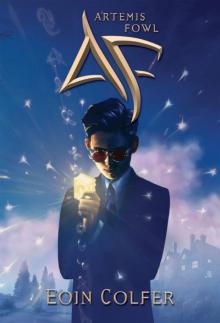 Artemis Fowl
Artemis Fowl Plugged
Plugged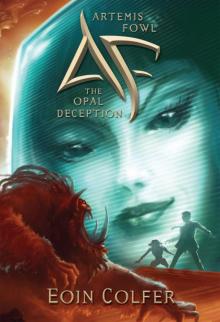 The Opal Deception
The Opal Deception The Arctic Incident
The Arctic Incident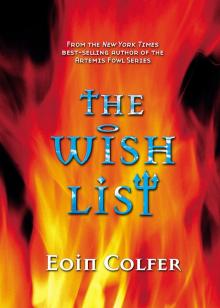 The Wish List
The Wish List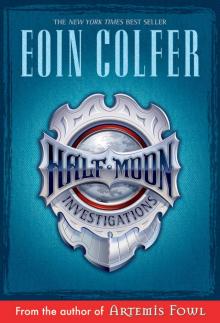 Novel - Half Moon Investigations
Novel - Half Moon Investigations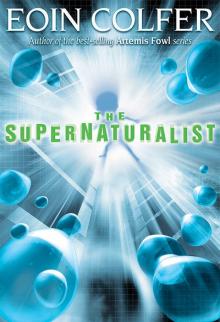 The Supernaturalist
The Supernaturalist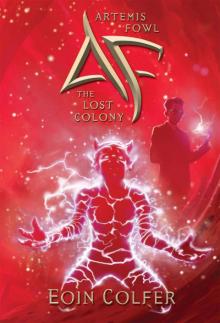 The Lost Colony
The Lost Colony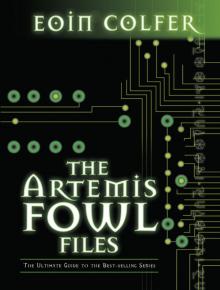 The Artemis Fowl Files
The Artemis Fowl Files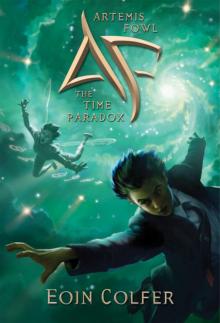 The Time Paradox
The Time Paradox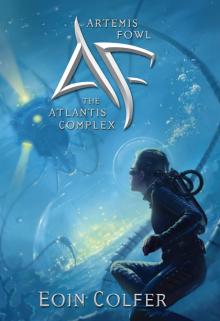 The Atlantis Complex
The Atlantis Complex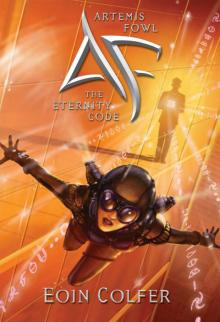 The Eternity Code
The Eternity Code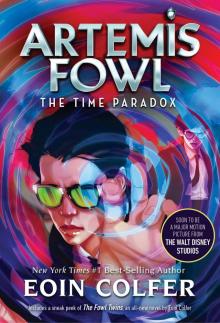 The Time Paradox (Disney)
The Time Paradox (Disney)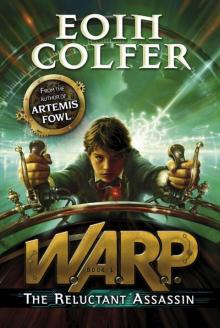 The Reluctant Assassin
The Reluctant Assassin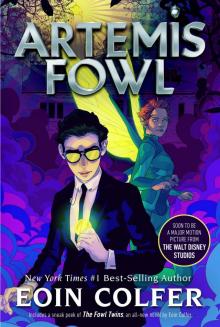 Artemis Fowl (Disney)
Artemis Fowl (Disney) Highfire
Highfire The Last Guardian
The Last Guardian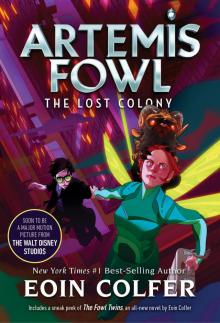 The Lost Colony (Disney)
The Lost Colony (Disney) Screwed: A Novel
Screwed: A Novel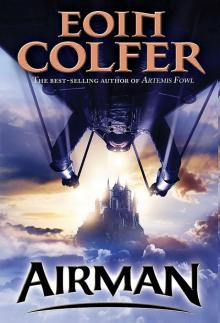 Novel - Airman
Novel - Airman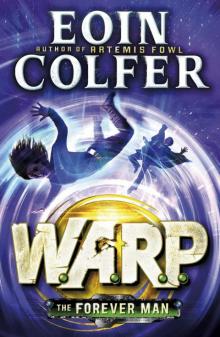 The Forever Man
The Forever Man And Another Thing...
And Another Thing...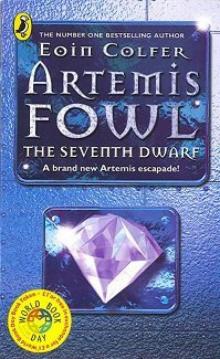 The Seventh Dwarf
The Seventh Dwarf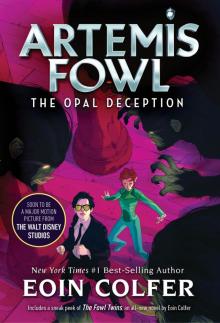 The Opal Deception (Disney)
The Opal Deception (Disney)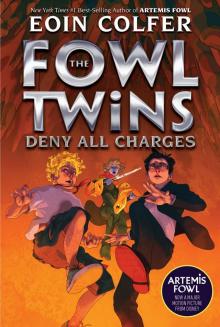 The Fowl Twins Deny All Charges
The Fowl Twins Deny All Charges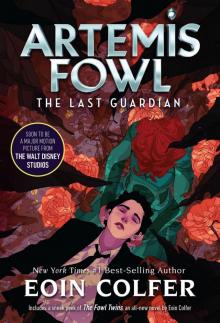 The Last Guardian (Disney)
The Last Guardian (Disney) The Hangman's Revolution
The Hangman's Revolution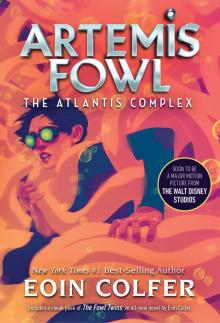 The Atlantis Complex (Disney)
The Atlantis Complex (Disney)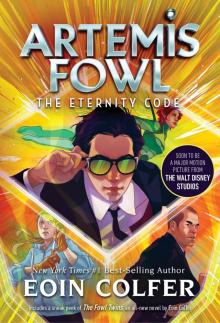 The Eternity Code (Disney)
The Eternity Code (Disney)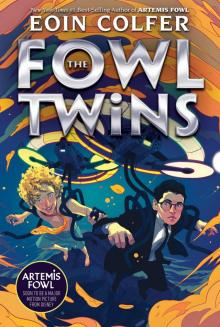 The Fowl Twins
The Fowl Twins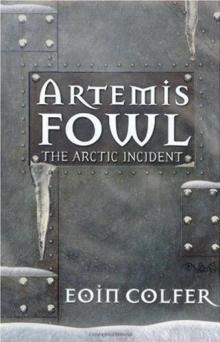 Artemis Fowl. The Arctic Incident af-2
Artemis Fowl. The Arctic Incident af-2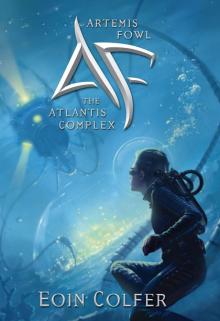 Artemis Fowl and the Atlantis Complex af-7
Artemis Fowl and the Atlantis Complex af-7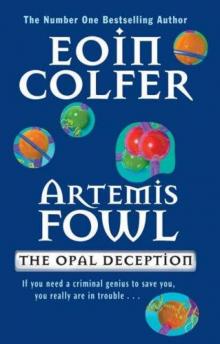 Artemis Fowl. The Opal Deception af-4
Artemis Fowl. The Opal Deception af-4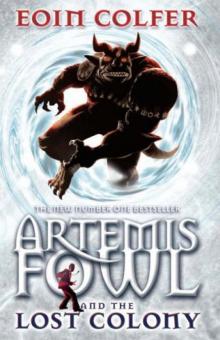 Artemis Fowl. The Lost Colony af-5
Artemis Fowl. The Lost Colony af-5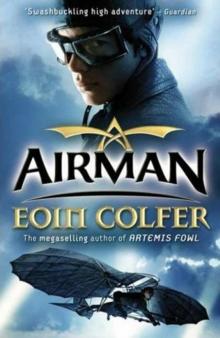 Airman
Airman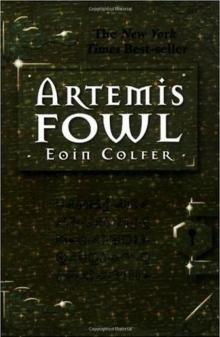 Artemis Fowl af-1
Artemis Fowl af-1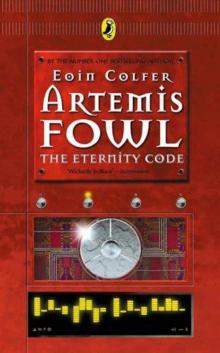 Artemis Fowl: The Eternity Code af-3
Artemis Fowl: The Eternity Code af-3 Screwed dm-2
Screwed dm-2